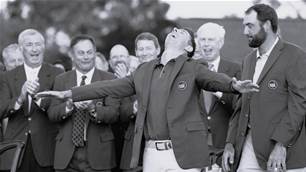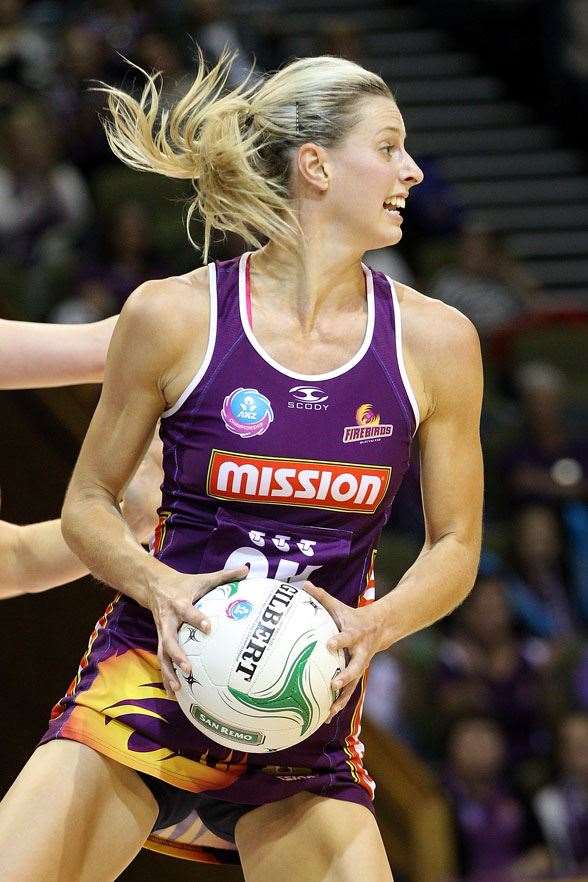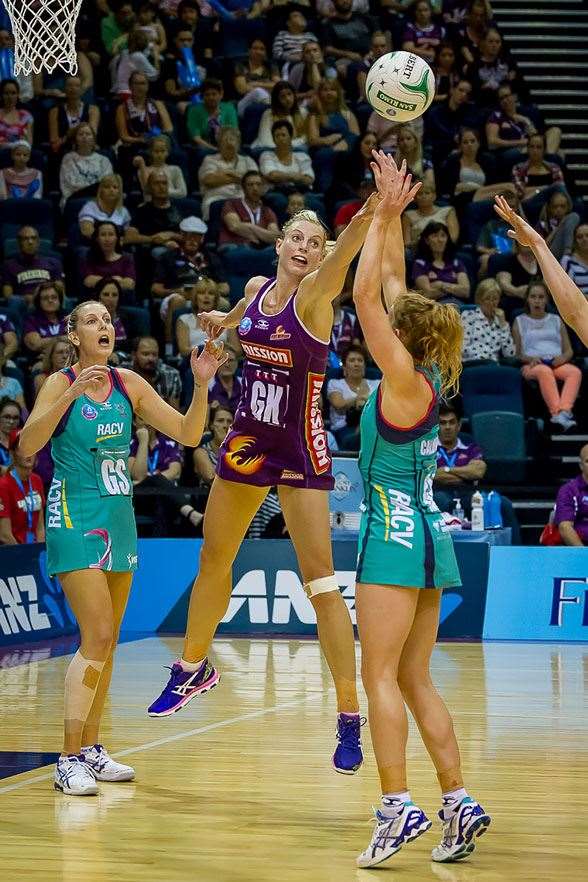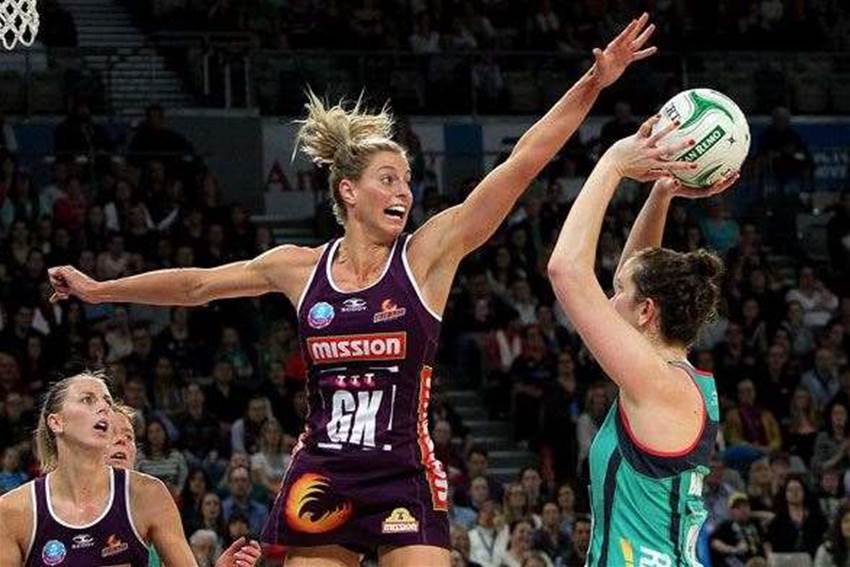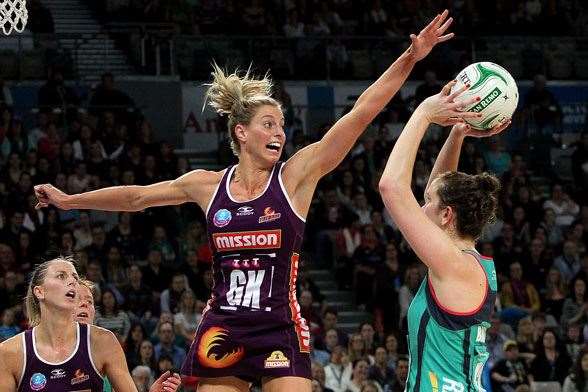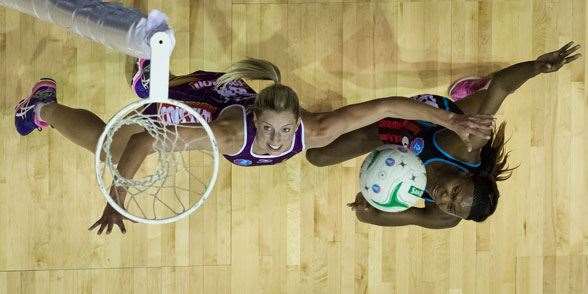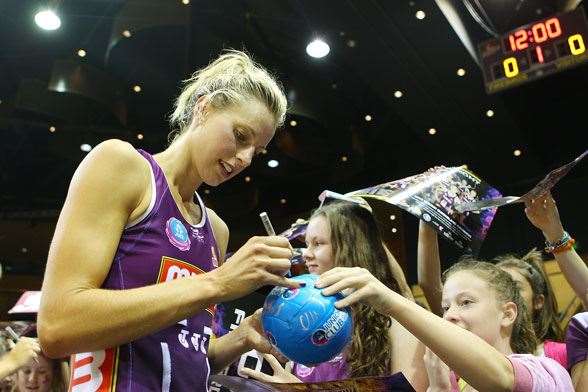Why Queensland Firebird Laura Geitz is the face of Australian netball.
Hisense Arena has exploded into a frenzy of celebration, tears of joy and hugs. The Vixens, pride of the Victorian netball community, have just toppled the Queensland Firebirds by 11 goals in the 2014 ANZ Championship grand final and are ready to party. The play button is pushed on Pharrell Williams’ Happy and the joint is rocking, domestic netball’s ultimate prize in Melbourne’s clutches for the first time since 2009. Fox Sports’ roaming mic has found defeated captain Laura Geitz up one end of the court, glassy-eyed, sweaty, buggered, heartbroken. It’s the second successive grand final loss for Queensland, on the back of 2013’s two-goal defeat to the Adelaide Thunderbirds.
Footage of the bravely smiling Geitz’ TV interview is beamed around the stadium, at first competing for air and noise real estate with the super-joyous Pharrell. Then something eerie happens. As if listening to an address from the Capitol in The Hunger Games, or a final farewell speech from Lou Gehrig at Yankee Stadium, the crowd instantly turns pin-drop silent, gazing hypnotically at either Geitz’ image emblazoned on the venue’s jumbo screen, or the real thing in front of them down where her hero Roger would normally be serving on centre court. The music is quickly switched off and all ears are open to Geitz’ brief one-minute summation of where her Firebirds went wrong. Too many errors in the second half, too much pressure and perfectly executed trips down the court from the Vixens. Her every word is religiously consumed by thousands of opposition supporters. This episode, and the thunderous cheers Geitz receives at the end of her interview, says it all about her status in Aussie netball. When the captain speaks, the sport's 1.2 million participants listen.
The 185cm-tall Queenslander, a proud product of the small town of Allora in the Darling Downs, about two hours’ drive south-west of Brisbane, is in her third year as captain of the Australia Diamonds, arguably the most supreme, elite-level squad in world netball. It’s not a role the 27-year-old was necessarily born for; she found out the hard way what pressure can do to an L-plate leader when she was benched in her first game as skipper. And to say she plays mother hen to her team-mates would be selling them short as world-class athletes. Geitz, though, is far more than a goalkeeper or goal defender – she’s the custodian and driver of the Australian squad’s ruthless fighting spirit, watching her girls fire the ball back up court after she either pulls off a miraculous intercept in an opposition attacking raid, or smashes the ball out of the air just before it lands in the shooter’s hands.
As mere spectators to the cauldron of intensity that is international netball, we can only imagine what it’s like out there in the heat of the hardcourt battle, but it has got to be infuriating to rival sides who dedicate hundreds of hours of training to honing their attacking tactics, only for the long, powerful limbs of Geitz to ruin it all in a split-second ...
Australian netball speaks much more highly of her. To them, Geitz is priceless. Her professionalism and self-proclaimed duty to serve and protect the game are renowned in the sport. As netball begins to enjoy the spoils that pay-TV and free-to-air television coverage has offered blokes’ games like footy and basketball for years, the sport could not hope for a better symbol, role model, leader than Geitz if they’d built a fem-bot-type being themselves.
Just before we went to press, netball announced that Fox Sports and Network Ten would be keeping the action coming, with every match of the next two ANZ Champs seasons to be televised, many of them live. But the game should be an easier sell to the wider general public than it’s proven over the decades. There’s heavy contact, which often results in actual pain and injury (will that do it for you, blokes?), thrilling finishes and outstanding examples of athleticism.
The next two years, then, will prove crucial to what market ground netball can make in Australia – without doubt the most competitive landscape in the known sporting world. To its credit, the game has never tried to forge ahead via any other means than through its grassroots appeal to thousands of school-aged Saturday morning warriors, raising the question: do their mums bring them to netball, or the other way around? The result is a rock-solid foundation of passionate and loyal disciples. Geitz was one, is still one. She is netball’s brightest Diamond.
THE DIAMOND
Inside Sport meets Laura Geitz at the pre-season Summer Shootout tournament at Homebush’s new Netball Central facility. Geitz has been spared from the rigours of on-court action over the weekend as she recuperates from left knee surgery undergone late last year, but she’s still decked out in her team’s sleek training uniform in solidarity. As one of the game’s marquee players, Geitz is staring down the barrel of an arduous 2015 playing schedule which features the usually brutal ANZ Championship season, followed by this year’s Netball World Cup in Sydney in August. “Each year, the standard of netball here is getting better and better; it’s wonderful,” Geitz beams. “No training can prepare you for it. You ask any of the girls here today, who have all just gone through the hardest pre-season. They’ll come and play a 15-minute game here and feel like they haven’t done anything for six months, because of the change of directions, the speed ... nothing really compares.” Geitz’ Test cap count stands at 32, but it’s her first meeting with the Kiwis that leaves the greatest indent on her career. If she indeed does need lasting proof that nothing compares with court time at the highest level, it’s that first game in 2008. “I found the intensity was just something you could not possibly train for,” Geitz recalls. “Until you get out there and experience a Kiwi-Aussie game, it’s just on another level, you know? It’s just the best of the best going head-to-head. There’s an element of physicality, an element of mental toughness. For 60 minutes the score can be separated by one or two goals, and then you find yourself at the end of 60 minutes being equal ... so you have to play on.
“Realistically, when you face the Silver Ferns, or in any international match or even in the ANZ, you actually now have to be prepared to play for longer than four quarters. The games are so closely matched and so evenly contested. The game is just so fast. Until you play in it, until you see the speed of the ball and the movements of the girls, the strength of the girls ... ”
Two years after her international debut, a silver medal at the Delhi Comm Games in 2010 continued the dream for Geitz. The Diamonds’ success in the deciding match of the 2011 World Championships in Singapore topped off another terrific year all-round for the ’keeper, who had also enjoyed a faultless run with the Firebirds at domestic level.
But all that was nothing ...
In August 2013, the Diamonds needed a replacement for their skipper across four years, the veteran Natalie Bode (nee von Bertouch), who had decided to call it a day. Geitz accepted, then burst into tears. “The beginning of 2013 was pretty tough for me personally,” she remembers. Her father Ross had passed away in a farming accident. Geitz offered to quit the game in order to help her family get through its tragedy, but her mum wouldn't have anything of it. “Later that year the Firebirds had made it through to the grand final; I had only been captaining them for two years. Really, the only things I could draw on as far as captaining the Diamonds was concerned were the leaders who I had looked up to, who had inspired me. What did they do to inspire me and how did they get the best out of me?
“My first game as captain of the Diamonds was the biggest learning experience ever. And it went horribly wrong. But looking back, it was probably the best thing that could’ve happened. We were playing in Invercargill. I started the game as goalkeeper. I was so nervous and worked up and was probably too concerned about everyone else in the camp when I probably should’ve just looked after myself and let everyone look after themselves, because that’s what they’re best at. I was just totally distracted and thought I had to go out and absolutely set the world on fire and play my best netball ... and probably put a huge amount of pressure on myself instead.
“I came off. We lost that game by four goals or something. Heading into the press conference after, the Kiwi media, you know, were obviously asking the question: ‘How does it feel to be the first captain of Australia to have been sat on the bench?’ That was a really disappointing moment for me, but I think a wonderful thing was that it forced me to walk away and think, ‘I’m in this role because of the work I have done before ... and why change what’s worked for me in the past? I shouldn’t be trying to be something I’m not.’
“A few days later, we played in Auckland. In between matches the Australian coach Lisa Alexander and I had a really good chat. In that next game, I really tried to lead from the front with my actions on court. We eventually won the series 5-1. With each game I grew with momentum and confidence. I think the best thing about leadership is never thinking you have it down pat. It’s about always being open to learning and understanding how different people work, and being able to adapt to different teams and to the different girls you have in your team.”
Oh to be a fly on the wall of the press box of those dastardly Kiwi journos, then, when the Diamonds, under Geitz’ leadership, brought home Australia’s first netball Comm Games gold medal in 12 years at Glasgow, or as she guided her Diamonds to 13 victories against seven countries in an undefeated 2014 calendar year. As already alluded to, there’s a World Cup on the way, so here’s hoping there’s more humble pie for them to dine on soon. “The Aussie squad for the World Cup is a bit tricky, because it’s still a bit unknown to a certain extent,” says Geitz. “Last year the Aussie team was picked pretty much mid-way through an ANZ season, which can be a little bit of a distraction, but the girls and the coaching staff managed it really well. This year the Aussie team won’t be announced until after the ANZ Championships. I think it’s really important for all the girls who are wanting to make the Diamonds squad to really concentrate first and foremost on a solid ANZ season with their franchises. That’s where the selections are made from. Sometimes you can get too far ahead of yourself by looking at the bigger events ... but every girl would want the opportunity to represent their country at a World Championships in front of a home crowd.”
THE FIREBIRD
There’s more to the Queensland Firebirds story than a funky name, glitzy players and a purple uniform. Among the original eight teams to compete in the old Commonwealth Bank Trophy established in 1997, they fought and scrapped for everything they could against teams like the Melbourne Kestrels, Adelaide Ravens and Sydney Sandpipers (feeling old yet?). From 11 seasons the best the Firebirds achieved was fourth in 2006. At the time, another foundation Trophy team, the AIS Canberra Darters – an important development avenue for the nation’s emerging netball talent since 2003 – were being led around the court by a lithe 18-year-old tall timber from Queensland called Laura Geitz. In ’08 the ANZ Champs were established, the Darters disbanded, and Laura was back playing netball a lot closer to home.
The “ANZ”, a revamped ten-team competition involving squads from both Australia and New Zealand, acted as an alarm clock for the sleeping giant of Australian netball that was the Firebirds; three consecutive fifth-placings in the initial years of the tournament was a massive improvement on their days when they were pipped by even the young Darters in the old competition.
In 2011, the Roselee Jencke-mentored Firebirds not only claimed their maiden Australian domestic crown, but also earned their place among this nation’s all-time great elite-level sporting teams by remaining undefeated throughout the season. Even considering that the domestic netball season is shorter than comps like the AFL, NRL, Super Rugby and the A-League, an undefeated season is considered one of the Holy Grails in the modern era of professional sport. A look back through the archives tells you no one has been able to go undefeated in rugby league since the 1925 Rabbitohs. No one before or since in the round-ball game in Australia has matched the Roar’s 36-game undefeated run under Ange, while it’s never been achieved in top-level Aussie rules.
The passing of time has helped Geitz appreciate what the Firebirds achieved in 2011 with their ruthless full-court defensive pressure. “When we won that premiership, we probably didn’t realise how special it was when we were holding up the trophy,” she recalls. “You play a few years on and you realise, ‘Gosh, how did we do that? How did we go through 2011 undefeated? I think firstly we did a really hard, hard pre-season. We were nearly broken. We pushed ourselves beyond limits we never knew existed. Mentally, when we went out on court, we kind’ve just knew we had trained the hardest and that we could outrun these guys. That gave us confidence and we were able to just run out games and finish teams off and push on. The momentum that grew from that pre-season was pretty sensational. I think everyone just knew their role in the team and everyone bought into what we stood for. Everything just clicked. Nothing was ever a hassle. Whether it be travelling away for the weekend to play, everyone just picked up the slack and it was just a well-oiled machine in so many different ways. We just had the belief amongst the group. We’d be down, but no one ever panicked because we just knew we’d come back and win it. You just have to look at each other out on court and you know you have that belief that’s within the group.”
With two consecutive heartbreaking grand final losses to motivate them, the Firebirds are ready to rock in 2015. Already boasting national centre Kim Ravaillion, one of the real exciting young talents in Australian netball, they still also have defensive master Clare McMeniman to help Geitz lock up the back. Then there’s 1.96m tall Jamaican superstar shooter Romelda Aiken, and Diamond Bec Bulley, who has crossed the border after many years’ service for the NSW Swifts. Third time lucky for Geitz and the girls in 2015 perhaps ...
THE INSPIRATION
Whether they like it or not, athletes are role models for young people, appearing on primetime television night in, night out and all through the weekend. But what’s often missed on critics of “failed” role models is that kids’ heroes can be chosen for them. There have to be other reasons mums take their daughters to Hisense, BEC or Acer Arena than just to watch quality netball ... The players’ appeal as role models is powerful. “You very rarely ever see netballers out and about doing the wrong things, because they’re just switched on, they know what they have to do discipline-wise, and they work hard,” Geitz says. “I think that’s why we want the game to get bigger. We also want to keep that mentality that we do play for the love of it. I think it’s important for us to continue to educate the younger girls coming through and for the younger girls to educate the next generation coming through.”
It wasn’t that long ago that Geitz was an up and comer herself, gazing in bewildered awe at the talent on show on the elite stage when she’d arrived in rep camps. “I definitely had a lot of respect for Sharelle McMahon. She was my first Australian captain when I first came into the team. She was just an inspirational person on court, but so level-headed and modest and well-respected off the court. I remember watching her as a young girl playing. She was always the one that would win the game for them. I used to think she was the whole package. I still have a lot of respect for Sharelle. She was a wonderful captain and player to look up to.”
Now, we can gush all we like about how wonderful Geitz is for netball, but the truth is not even a player of her calibre and appeal is able to make a living from playing full-time. Geitz’ MVP team-mate here is her husband Mark Gilbride, a former rugby union player and Laura’s business partner. (Theirs is a complicated hierarchy, as they both answer to the boss, their dog “Charlie”.) Geitz’ self-titled website, showcasing her clothing line and netball clinic opportunities, is one way of keeping the dollars coming, which, if she was a man performing on the big stage, she’d be earning as part of her playing salary. Mid-last year she lengthened her ambassadorial role with equipment brand Spartan, which will help with the bills too. “I definitely don’t like to be seen whinging about how we don’t get paid as much as the blokes,” Geitz says. “That’s not what I’m about. I’m extremely proud of the game we have and the women associated with our game. Probably what I’m most proud of, though, is the fact we play for the love of it. Sometimes you see that too much money is involved in sport. That’s when people's love for the game and other things – other morals, other values – can disappear.”
Related Articles

Feature Story: Moving the Needle

The Aussies at The Open
